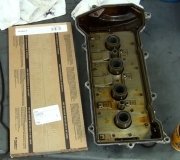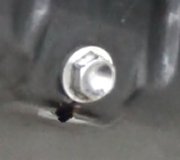Wednesday, September 9th, 2009 AT 2:10 AM
Bought used at 90000 had heard of many problems with heads and gaskets so I changed oil more than regularly and flushed coolant, never used any oil or coolant and still has not to this day. I was driving on the interstate 75-80 for about 300 mi. But not abusively and started hearing a slight tap, steady and mainly when the load was off the engine, in the transition from coasting to accelerating. Engine never lost power, missed, backfired, smoked, no warning lights, nada thing. Made it home 40 mi later and could not find any signs of problems, no leaks, all fluids topped off and clean, no cross contaminations just the noise. Stethascope and hose inspection indicated loudest above valve cover on front head nearest bumper. It sounds like clack-tap-clack and too frequent to be a main, rod bearing or wristpin. Pulled valve cover off and started for 5 seconds, had oil pressure and rockers/valves seemed ok. Noise goes away at idle but very, very loud when revving at all, sounds like its going to fly apart and/or do major damage. So I pull the heads off, nothing found visually to indicate such a noise, the only thing is the area around the lifters has a lot of soft varnish that upon further inspection I took clips off a couple of lifters and found about (the amount of a grain of rice of soft carbonized varnish, the same thing that is built up on the valley of the block above the cam). There is no sign of wear from lack of oil on any surfaces, all surfaces look good, visually. Inspection of pushrods, rockerarms, camshaft all ok. A couple of exhaust valves seem white from heat and one of the pistons has a discoloration from heat in the area below the valve. There is a considerable amount of carbon on some of the intake valves inside the head around the seat area, will this cause a lot of noise? All gaskets and surfaces look good and no visable leakage. Could a lifter cause this kind of noise, especially if it is clogged with carbon? Could it be a valve burnt causing this noise? I will drop the heads off to be checked, but I have a bad feeling thats not the problem, can I get some experienced feedback? Has anyone seen clogged lifters? And will they cause this kind of noise? Can they be cleaned and reused? Could buildup on the intake valves cause this much noise?



